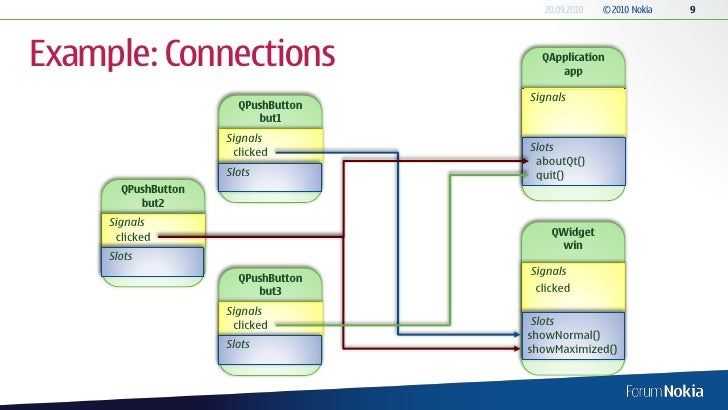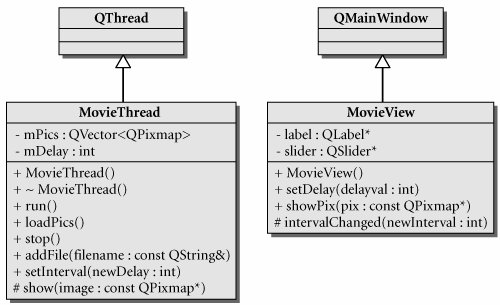- The Qt signals/slots and property system are based on the ability to introspect the objects at runtime.
- How Qt Signals and Slots Work - Part 3 - Queued and Inter Thread Connections This blog is part of a series of blogs explaining the internals of signals and slots. All the thread cleanup information transfer must only happen with events posted between threads.
- This wrapper provides the signals, slots and methods to easily use the thread object within a Qt project. To use it, prepare a QObject subclass with all your desired functionality in it. Then create a new QThread instance, push the QObject onto it using moveToThread(QThread.) of the QObject instance and call start on the QThread instance.
Connections can be added or removed at any time during the execution of a Qt application, they can be set up so that they are executed when a signal is emitted or queued for later execution, and they can be made between objects in different threads. The signals and slots mechanism is implemented in standard C.
Introduction

Remember old X-Window call-back system? Generally it isn't type safe and flexible. There are many problems with them. Qt offer new event-handling system - signal-slot connections. Imagine alarm clock. Wind creek casino slot games. When alarm is ringing, signal is sending (emitting). And you're handling it as a slot.
- Every QObject class may have as many signals of slots as you want.
- You can emit signal only from that class, where signal is.
- You can connect signal with another signal (make chains of signals);
- Every signal and slot can have unlimited count of connections with other.
- ATTENTION! You can't set default value in slot attributes. e.g.
void mySlot(int i = 0);
Connection
Qt Signals And Slots Thread Safe

Remember old X-Window call-back system? Generally it isn't type safe and flexible. There are many problems with them. Qt offer new event-handling system - signal-slot connections. Imagine alarm clock. Wind creek casino slot games. When alarm is ringing, signal is sending (emitting). And you're handling it as a slot.
- Every QObject class may have as many signals of slots as you want.
- You can emit signal only from that class, where signal is.
- You can connect signal with another signal (make chains of signals);
- Every signal and slot can have unlimited count of connections with other.
- ATTENTION! You can't set default value in slot attributes. e.g.
void mySlot(int i = 0);
Connection
Qt Signals And Slots Thread Safe
You can connect signal with this template:QObject::connect ( const QObject * sender, const char * signal, const QObject * receiver, const char * method);You have to wrap const char * signal and const char * method into SIGNAL () and SLOT() macros.
Qt Signals And Slots Between Threads Free
And you also can disconnect signal-slot:QObject::disconnect ( const QObject * sender, const char * signal, const QObject * receiver, const char * method);
Deeper
Widgets emit signals when events occur. For example, a button will emit a 'clicked' signal when it is clicked. A developer can choose to connect to a signal by creating a function (a 'slot') and calling the connect() function to relate the signal to the slot. Qt's signals and slots mechanism does not require classes to have knowledge of each other, which makes it much easier to develop highly reusable classes. Since signals and slots are type-safe, type errors are reported as warnings and do not cause crashes to occur.
For example, if a Quit button's clicked() signal is connected to the application's quit() slot, a user's click on Quit makes the application terminate. In code, this is written as
connect(button, SIGNAL (clicked()), qApp, SLOT (quit()));
Connections can be added or removed at any time during the execution of a Qt application, they can be set up so that they are executed when a signal is emitted or queued for later execution, and they can be made between objects in different threads.
The signals and slots mechanism is implemented in standard C++. The implementation uses the C++ preprocessor and moc, the Meta-Object Compiler, included with Qt. Code generation is performed automatically by Qt's build system. Developers never have to edit or even look at the generated code.